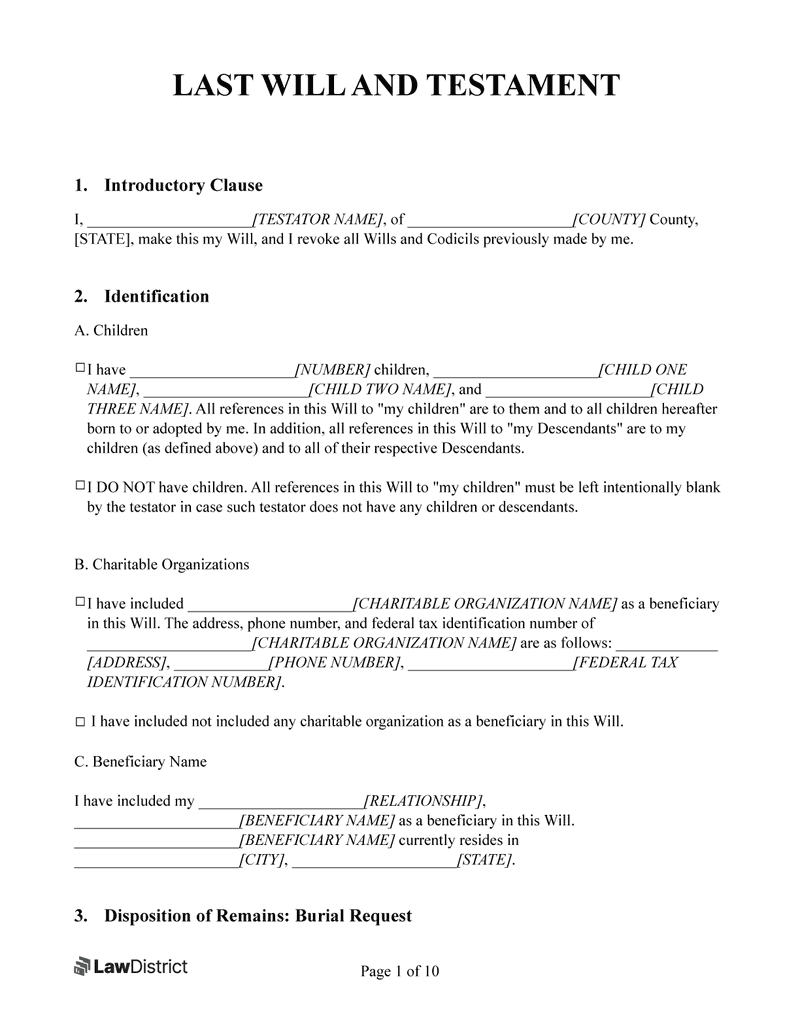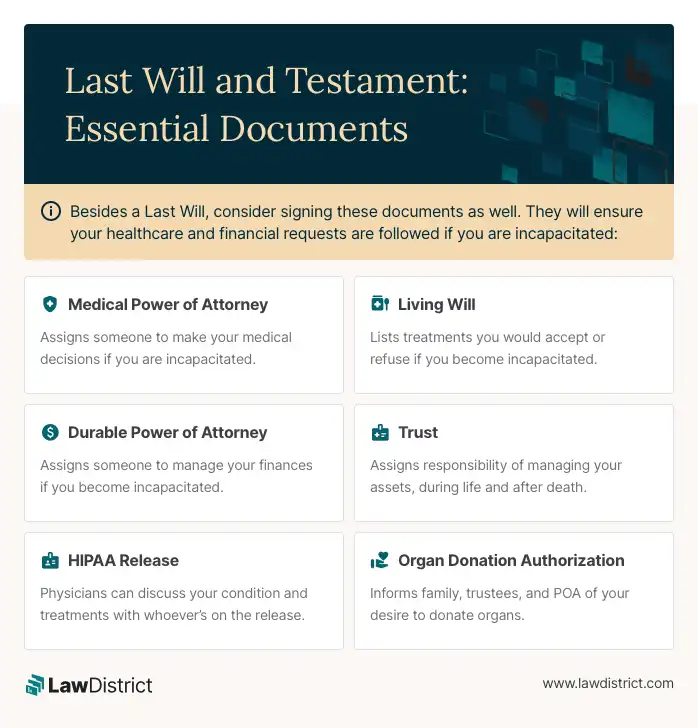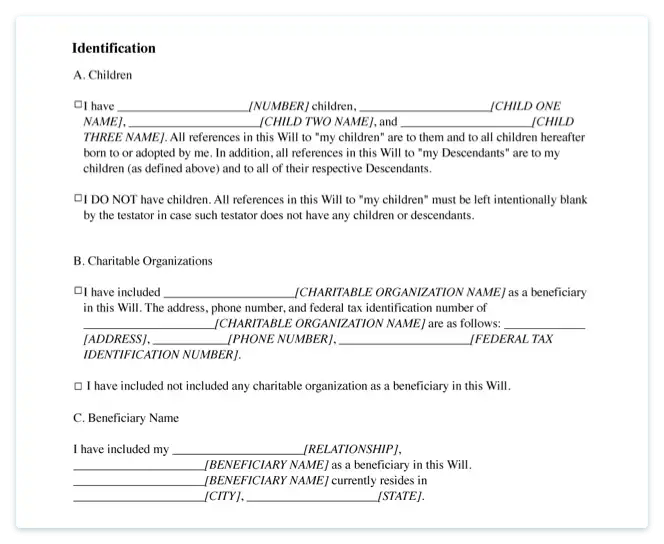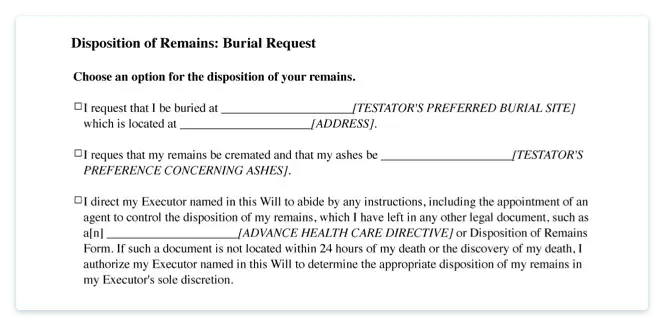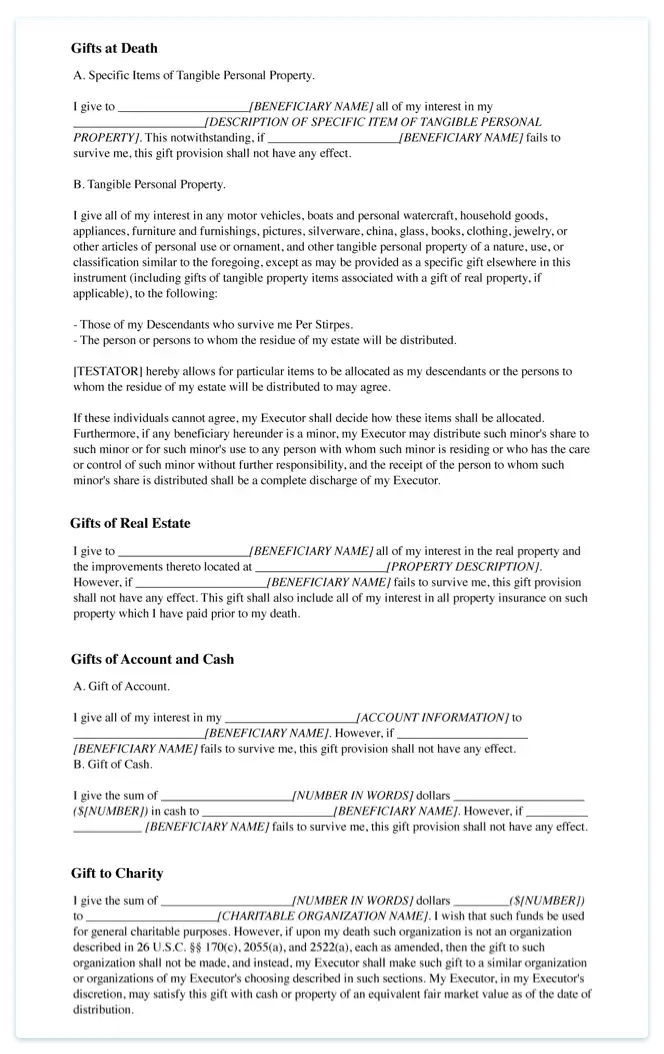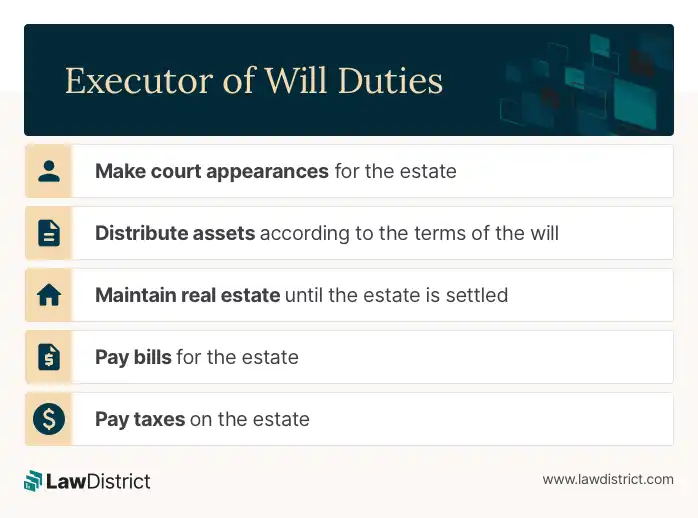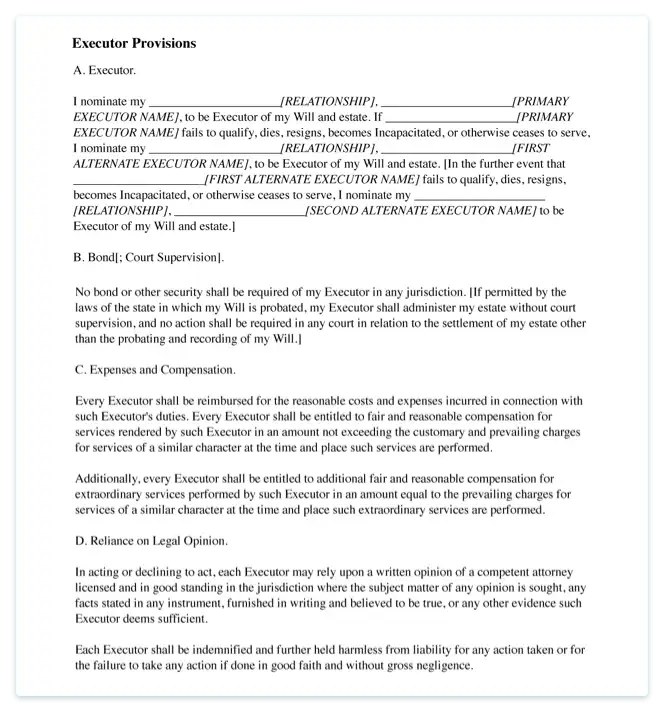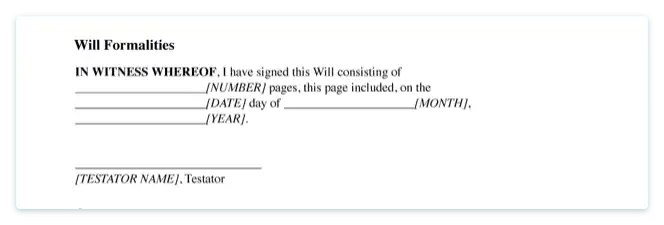LAST WILL AND TESTAMENT OF _________
I, _________, of _________, _________ County, Alabama, make this my Last Will, and I revoke all Wills and Codicils previously made by me.
Marital Status
1. I am not currently married.
Current Children
2. I currently do not have any living children.
3. All references in this Will to "my children" are to all children hereafter born to or adopted by me.
Definition
4. The Executor is defined as the fiduciary charged with administering the estate at the testator's death. Some jurisdictions use the term personal representative to refer to the estate fiduciary and some jurisdictions use the term and 'executrix'.
Nomination
5. I nominate _________ of _________, _________, to be my independent Executor of this Will.
If _________ dies, or fails to qualify, resigns, becomes incapacitated, or otherwise ceases to serve as my Executor, I nominate the survivor of _________ to be my independent Executor of this Will.
6. No bond or other security shall be required of my Executor in any jurisdiction. No action shall be required in any court in relation to the settlement of my estate other than the probating and recording of my Will and, if required by law, the return of an inventory, appraisement, and list of claims of my estate, or the filing of an affidavit in lieu of such inventory if permitted by law.
Executor Powers
7. The Executor shall, to the extent permitted by law, act independently and free from the control of any court as to my estate (and as to all the property of my estate). The Executor shall have and possess the following powers and authorities (each of which shall be exercisable at the discretion of such Executor) concerning my estate:
a. To pay my legally enforceable debts, funeral expenses, and all expenses in connection with the administration of my estate and the trusts created by my Will as soon as convenient after my death. If any of the real property devised in my Will remains subject to a mortgage at the time of my death, then I direct that the devisee taking that mortgaged property will take the property subject to that mortgage and that the devisee will not be entitled to have the mortgage paid out or resolved from the remaining assets of the residue of my estate.
b. To take all legal actions to have the probate of my Will completed as quickly and simply as possible, and as free as possible from any court supervision, under the laws of the State of Alabama.
c. Retention of Property
Except as otherwise provided in this Will, to retain any property which was owned by me at the time of my death when my Executor determines that, because of the circumstances involved, my estate would be better served by not diversifying the investment in such property.
d. Dealing in Estate Assets
Except as otherwise provided in this Will, to exchange, sell, manage, convey, or lease for cash, property, or credit, or to partition, publicly or privately, at such prices, on such terms, times, and conditions and by instruments of such character and with such covenants as my Executor deems proper, all or any part of the properties of my estate, including real property, and no vendee or lessee shall be required to look to the application of any funds paid to my Executor.
e. Borrowing and Managing Assets
Except as otherwise provided in this Will, to borrow money from any source (including any Executor) and to mortgage, pledge, or in any other manner encumber all or any part of the properties of my estate as may be advisable in the judgment of my Executor for the advantageous administration of my estate. The Executor shall also have the power to maintain, convert, purchase and liquidate investments and securities. Further, the Executor shall have the power to vote stock or exercise any option concerning any investments or securities without liability for loss.
f. Banking
Except as otherwise provided in this Will, to open or close bank accounts.
g. Business Operations
Except as otherwise provided in this Will, to maintain, continue, dissolve, change or sell any business which is part of my estate, or to purchase any business if deemed necessary or beneficial to my estate by my Executor.
h. Closely Held Businesses
Except as otherwise provided in this Will, to continue any business (whether a proprietorship, corporation, partnership, limited partnership, or other entity) which I own or in which I am financially interested at the time of my death for such time as my Executor deems it to be in the best interests of my estate; to employ in the conduct of any such business such properties of my estate as my Executor deems proper; to borrow money for use in any such business alone or with other persons financially interested in such business, and to secure such loan or loans by mortgage, pledge, or any other manner of encumbrance of not only my interest in such business but also such other properties of my estate as my Executor deems proper; to organize, either alone or jointly with others, new corporations, partnerships, limited partnerships, or other entities; and generally to exercise concerning the continuance, management, sale, or liquidation of any business which I own or in which I am financially interested at the time of my death or of any new business or business interest, all the powers I could have exercised during my lifetime.
i. Distribution to Beneficiaries
Except as otherwise provided in this Will, to make, in the discretion of my Executor, any distribution required or permitted to be made to any beneficiary under this Will.
j. Legal Affairs
Except as otherwise provided in this Will, to claim, maintain, settle, sue, quit, or otherwise deal with any lawsuits against my estate. Further, the Executor shall also have the power to seek legal representation, accountant consultancy, or any other professional aid necessary for the benefit of the estate.
k. Distributions in Kind
Except as otherwise provided in this Will, to make divisions, partitions, or distributions in money or in kind, or partly in each, whenever required or permitted to divide, partition, or distribute all or any part of my estate and, in making any such divisions, partitions, or distributions, the judgment of my Executor in the selection and valuation of the assets to be so divided, partitioned, or distributed shall be binding and conclusive. Further, my Executor shall not be liable for any differing tax consequences for the beneficiaries of my estate. Lastly, my Executor shall be authorized to make distributions from my estate on a non-pro-rata basis.
l. Investing
Except as otherwise provided in this Will, to invest and reinvest the properties of my estate in any kind of property whatsoever, real or personal, whether or not productive of income, and such investments and reinvestments may be made without regard to the proportion that such property or property of a similar character held may bear to my entire estate if my Executor determines that, because of the circumstances involved, my estate would be better served by not diversifying such investment or reinvestments.
m. Dealing with Interested Parties
Except as otherwise provided in this Will, to enter into any transaction on behalf of my estate (including loans to beneficiaries for adequate security and adequate interest) despite the fact that another party to any such transaction may be:
(i) a trust of which any Executor under this Will is also a trustee;
(ii) an estate of which any Executor under this Will is also an executor, personal representative, or administrator, including my estate;
(iii) a business or trust controlled by any Executor under this Will or of which any such Executor, or any director, officer, or employee of any such corporate Executor is also a director, officer, or employee; or
(iv) any beneficiary or Executor under this Will acting individually.
n. Delegation and Agents
Except as otherwise provided in this Will, to employ attorneys, accountants, investment managers, specialists, and such other agents as my Executor shall deem necessary or desirable; to have the authority to nominate an investment manager or managers to manage all or any part of the assets of my estate and to delegate to said manager investment discretion and such nomination shall include the power to acquire and dispose of such assets; and to charge the compensation of such attorneys, accountants, investment advisors, investment managers, specialists, and other agents and any other expenses against my estate.
o. Payment of Debts
Except as otherwise provided in this Will, to use the cash and any of the securities or other property owned by me to satisfy any loans or other debts for which my estate is liable or to continue all or any portion of such loans or debts.
p. Storing Personal Property
Except as otherwise provided in this Will, to store personal property given to a person who is a minor or who is incapacitated for later distribution to such person.
q. Digital Assets
Except as otherwise provided in this Will, to access, utilize, manage, close, control, cancel, deactivate, or delete any Digital Accounts and Digital Assets in which I had a right or interest at my death. This authorization is intended to be construed to be lawful consent under the Electronic Communications Privacy Act of 1986, as amended; the Computer Fraud and Abuse Act of 1986, as amended; and any other applicable federal or state data privacy law or criminal law.
Digital Asset means an electronic record in which I had a right or interest at death and may include data, files, documents, audio, video, images, sounds, social media content, social networking content, apps, codes, credit card points, travel-related miles and points, computer source codes, computer programs, software, software licenses, databases, or the like, which are created, generated, or stored by electronic means.
r. Distributions to Minor or Incapacitated Beneficiaries
Except as otherwise provided in this Will, to make, in the discretion of my Executor, any distribution required or permitted to be made to any beneficiary under this Will in any of the following ways when such beneficiary is a minor or is incapacitated:
(i) to such beneficiary directly;
(ii) to the guardian or conservator of such beneficiary's person or property;
(iii) by utilizing the same, directly and without the interposition of any guardian or conservator, for the health, support, maintenance, or education of such beneficiary;
(iv) to a person or financial institution serving as custodian for such beneficiary under a Uniform Gifts to Minors Act or a Uniform Transfers to Minors Act of any state;
(v) by reimbursing the person who is actually taking care of such beneficiary (even though such person is not the legal guardian or conservator) for expenditures made by such person for the benefit of such beneficiary;
(vi) by managing such distribution as a separate fund on the beneficiary's behalf and the written receipts of the persons receiving such distributions shall be full acquittances to my Executor.
s. Except as otherwise provided in this Will, to be my Trustee and hold in trust the share of any minor beneficiary, to carry out any act to keep such share invested, pay the income or capital as my Executor considers advisable to maintain and educate such minor beneficiary until the beneficiary is legally an adult.
In the alternative, the Executor must carry out the acts stated above prior to such beneficiary becoming a legal adult, to pay or transfer the share to any parent or guardian of such beneficiary, subject to the same conditions. If the parent or guardian receives such payment or transfer, then my Executor shall be discharged.
Statutory and Common-Law Powers
8. In addition to the powers granted above to the Executor, the Executor shall have and possess all powers and authorities conferred by statute or common law in any jurisdiction in which such Executor may act, except for any instance in which such powers and authorities may conflict with the express provisions of this Will, in which case the express provisions of this Will shall control.
The above authority and powers granted to my Executor are in addition to any powers and elective rights conferred by state or federal law or by other provision of this Will and may be exercised as often as required and without application to or approval by any court.
Distribution of Residue
9. A beneficiary shall survive me for at least thirty (30) days to have the right to receive any gift or property under this Will. The beneficiaries will receive and share such residue in equal shares, including property and assets that have not been bequeathed or that are not required to pay any debt, expenses associated with this Will, taxes, funeral expenses, or any other administrative expense resulting from my Will. All property given under this Will to my beneficiaries is subject to any encumbrances or liens attached to the property.
10. I instruct my Executor to distribute the residue of my estate in the following manner ("Share Allocations"):
a. The recipient _________ of _________, _________, shall receive all of the residue of my estate for their exclusive use and property.
11. However, if an appointed beneficiary dies before having a right to receive the whole of their share of the residue of my estate, then such share or the remaining amount of that share will be divided between the remaining beneficiaries proportionately, in accordance with the above-stated Share Allocations.
Wipeout Provision
12. If all my appointed beneficiaries die before I do or if I am not survived for at least thirty (30) days, I instruct my Executor to divide the residue of my estate into one hundred (100) equal shares. Further, my Executor shall pay and transfer such shares as follows:
a. 100 shares of the residue of my estate shall be divided equally amongst my parents and siblings, or their survivors, for their exclusive use and property. If these beneficiaries die before they have a right to receive their share of my estate, and such beneficiaries have survivors, then they shall have a right to be distributed their share of my estate.
Testamentary Trust For Minor Beneficiaries
13. I intend to create a testamentary trust (the "Testamentary Trust") for every minor appointed in this Will as my beneficiary. Further, I name my Executor(s) as trustee (the "Trustee") of any Testamentary Trusts created under this Will. All bequeathed, transferred, or gifted assets given to a minor beneficiary under this Will are to be held in a separate trust until the beneficiary reaches the designated age. All property given by me to a minor beneficiary under this Will shall be managed by my Executor(s) until that minor beneficiary reaches the age of majority.
Trust Administration
14. I instruct the Trustee to manage the Testamentary Trust in the manner that follows:
a. The Trustee shall manage all assets and property for the benefit of the minor until such minor reaches the age that I have established above for final distribution;
b. When the minor reaches the age that I have established above for final distribution, any remaining property and assets in the trust shall be immediately transferred to the minor beneficiary; and
c. Until the minor beneficiary reaches the age that I have established above for final distribution, my Trustee shall keep all trust assets invested. Further, my Trustee shall pay the whole or such part of the net income derived from those assets and any amount out of the capital that my Trustee may deem necessary to support, maintain, educate or benefit the minor beneficiary.
15. The Trustee shall have the discretion to use trust funds in any investment or to buy property. In using discretion, the Trustee shall always act with the care, skill, and diligence expected of a prudent person acting in a similar capacity.
Trust Termination
16. The Testamentary Trust shall terminate in any of the following events:
a. When the minor beneficiary reaches the age that I have established for final distribution;
b. Upon the death of the minor beneficiary; or
c. Upon the complete distribution of all trust assets.
My Trustee shall have the discretionary powers to manage the trust created herein to use them in the manner that follows:
a. The authority to make all expenditures necessary to undertake what is instructed under this trust;
b. Unless otherwise instructed in this Will, the discretionary power to sell, assign, pledge, exchange, or call in and convert into money any trust property, including real property, that the Trustee deems necessary;
c. Unless otherwise instructed in this Will, the discretionary authority to mortgage trust property;
d. Unless otherwise instructed in this Will, the discretionary authority to borrow money from any source and lend money to any beneficiary if it is in the best interest of such beneficiary;
e. Unless otherwise instructed in this Will, the authority to make expenditures for the benefit of the beneficiaries or for the purpose of maintaining any property;
f. Unless otherwise instructed in this Will, the authority to register and carry any securities or other property in the name of the Trustee or the name of the beneficiaries without increasing or decreasing the fiduciary liability of the Trustee;
g. Unless otherwise instructed in this Will, the authority to lease trust property, including real estate and personal property;
h. Unless otherwise instructed in this Will, the authority to make investments;
i. Unless otherwise instructed in this Will, the authority to accept, receive, receipt for, or exchange a share in or payment from an estate, trust, or any property from any source and in any form of ownership;
j. Unless otherwise instructed in this Will, the authority to employ and pay any person, including a corporation, to conduct any business. Further, the Trustee shall have the power to undertake any activity related to a trust created under my Will, including the receipt and payment of money. Lastly, I authorize my Trustee to name any person, including a corporation, to exercise any powers herein given to my Trustee concerning any property that belongs to the trust;
k. Unless otherwise instructed in this Will, to compromise, settle or waive any claims concerning the trust to the extent my Trustee considers it to be in the best interest of the trust beneficiaries. Further, my Trustee shall have the power to make a binding agreement with any other person, including a corporation;
l. Unless otherwise instructed in this Will, the authority to elect, determine, designate, or allocate on any action required by my Trustee under any provision of any statute, as my Trustee sees fit in their discretion and as such Trustee deems necessary and advisable. Further, each election, determination, designation, or allocation shall be final and binding on all persons;
m. Unless otherwise instructed in this Will, the authority to receive a reasonable compensation out of the trust assets; and
n. Unless otherwise instructed in this Will, to employ and rely on the advice given by legal or accountancy professionals to help the Trustee to administer the trust.
Unless otherwise instructed in this Will, the authority and powers that I grant herein to my Trustee do not preclude any additional powers conferred by state, federal law, or other provision of this Will.
a. Unless otherwise instructed in this Will, I instruct that my Trustee may not be held liable for any loss to my estate or to any beneficiary resulting from the exercise of the duties, authorities, and powers given to the Trustee under this Will;
b. If any provision in this trust is declared invalid, the other provisions shall continue to have legal effect.
Insufficient Estate
17. To the extent the value of my estate is insufficient to fulfill all bequests under this Will, my Executor shall have the authority to adjust each bequest proportionately.
No Contest Provision
18. If any beneficiary of my estate contests the probate or validity of this Will or any of its provisions, then all benefits provided for such beneficiary are revoked and shall pass as if that contesting beneficiary had failed to survive me. This provision shall be enforceable unless the party bringing the contest establishes that the contest was brought and maintained in good faith and that probable cause exists for contesting the Will.
Severability
19. If any clause or term of this Will is held to be unenforceable or invalid as a matter of law, all other provisions of this Will shall remain in effect to the fullest extent permissible under the governing law of this Will.
IN WITNESS WHEREOF, I have signed my name on this ________ day of ________________, ________, at _________, Alabama, declaring and publishing this instrument as my Last Will, in the presence of the undersigned witnesses, who witnessed and subscribed this Last Will at my request, and in my presence.
_____________________________
_________ (Testator) Signature
SIGNED AND DECLARED by _________ on the ________ day of ________________, ________ to be the Testator's Last Will, in our presence, at _________, Alabama, who at the Testator's request and in the presence of the Testator and of each other, all being present at the same time, have signed our names as witnesses.
| | |
| ________________________ | ________________________ |
| Witness 1 Signature | Witness 2 Signature |
| | |
| ________________________ | ________________________ |
| Witness 1 Name (Please Print) | Witness 2 Name (Please Print) |
| | |
| ________________________ | ________________________ |
| Witness 1 Street Address | Witness 2 Street Address |
| | |
| ________________________ | ________________________ |
| Witness 1 City/State | Witness 2 City/State |
I, _________, the Testator, sign my name to this instrument this _____ day of ____________________, 20____, and being first duly sworn, do hereby declare to the undersigned authority that I sign and execute this instrument as my Last Will and that I sign it willingly (or willingly direct another to sign for me), that I execute it as my free and voluntary act for the purposes expressed in the Last Will, and that I am eighteen (18) years of age or older, of sound mind, and under no constraint or undue influence.
________________________
Testator
We, ________________________ and ________________________, the witnesses, sign our names to this instrument, being first duly sworn, and do hereby declare to the undersigned authority that the Testator signs and executes this instrument as the Testator's Last Will and that the Testator signs it willingly (or willingly directs another to sign for the Testator), and that each of us, in the presence and hearing of the Testator, hereby signs this Last Will as witness to the Testator's signing, and that to the best of our knowledge the Testator is eighteen (18) years of age or older, of sound mind, and under no constraint or undue influence.
| ________________________ | ________________________ |
| Witness 1 Signature | Witness 2 Signature |
State of Alabama
COUNTY OF _____________________
Subscribed, sworn to and acknowledged before me by _________, the Testator, and subscribed and sworn to before me by ________________________ and ________________________, witnesses, this _____ day of ____________________, 20____.
(Seal)
(Signed) _____________________________
______________________________________
(Official capacity of officer)
